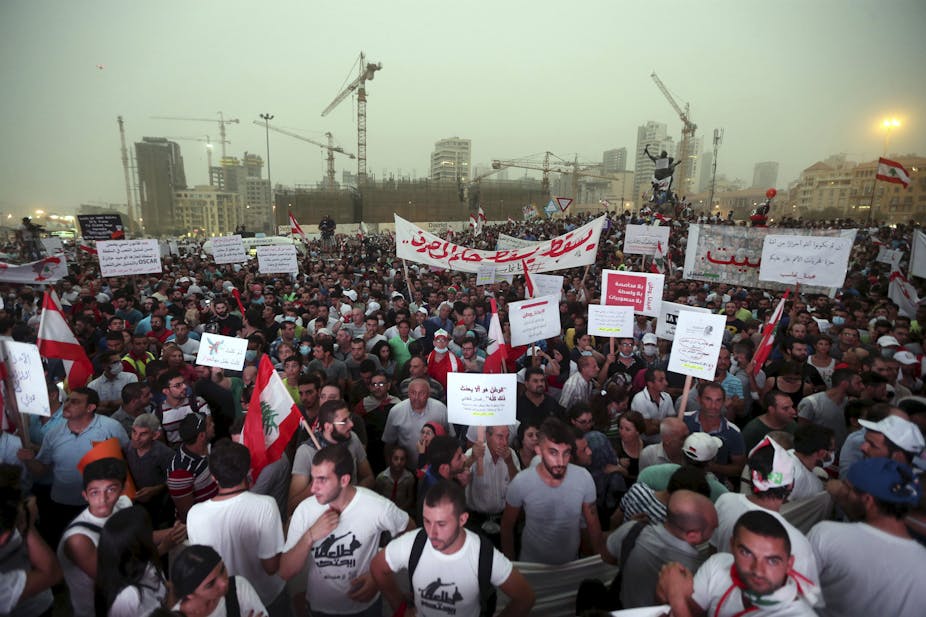Lebanon’s government has agreed to resume rubbish collection and disposal after weeks of massive protests – but the real causes of the protesters’ anger are still at work.
The recent protests may have superficially targeted the issue of trash collection (or rather, non-collection), but in fact, they transcended it. For many of the “You Stink” protesters, the estimated 20,000 tonnes of rubbish lying uncollected in Beirut’s streets are a perfect symbol of the the power-sharing government’s incompetence. Trapped in interminable political deadlock, the Lebanese state is unable to deal with even the most routine duties of government.
Two and a half decades after the end of the civil war, Beirutis are accustomed to daily electricity outages alongside the absence of many public services. People are wearily habituated to living in a deeply divided, corrupt and dysfunctional state long since captured by sectarian elites.
As things stand, 23 parliamentary sessions have failed to elect a new president, parliament has been unable to pass a budget for more than a decade, and parliamentary elections are delayed. Political appointments for the head of the military, central bank and judiciary – positions allocated on a sectarian basis – are long overdue.
Pie-sharing, not power-sharing
The sight and stink of the trash in Beirut’s streets was a rallying call for Lebanese people demanding the transformation of the sectarian system into a more liberal and secular democracy.
Lebanon’s contemporary power-sharing system was adapted to help end a devastating civil war that caused more than 140,000 deaths. Its main ethos is “no victor, no vanquished”; the idea is that no group can exercise dominance over the others. A full 18 sects are constitutionally recognised and given rights, but at a practical level six powerful sects dominate the state.
To ensure a balance of power, the main groups are guaranteed political representation by a quota system that reserves them seats and positions. The same system is enforced across the security forces, the financial sector, the judiciary and public administration.
Under this system, all individuals are members of their sect first and of society second. Lebanon’s state provides little way out for citizens that hold non-sectarian identities, such as feminists, LGBTQ people and secular people. In fact, even personal affairs such as marriage, divorce, inheritance and sexuality are devolved to the main religious leaders.
Civil marriage between members of different sects is prohibited unless the couple apply to have their sect identity removed from state records.
But while the sectarian system is supposed to foster a spirit of mutual coexistence between groups, it is dysfunctional and prone to periodic deadlock and conflict. It has allowed the various sectarian leaders to capture the state and pursue widespread corruption.

Much of the private sector – including refuse collection – is divided up between the sectarian elites, many of whom are former warlords. As the gap between rich and poor widens, the Lebanese call the sectarian system “pie-sharing” rather than “power-sharing”.
Spring in the air?
Beirut’s trash protests are organised by groups seeking to end political sectarianism. These groups are non-sectarian and want to see a modern, liberal democracy in Lebanon.
In recent years, there have been a number of attempts to create a mass social movement that challenges the sectarian state. In March 2013, 5,000 people marched on the Lebanese parliament in downtown Beirut in what was called a “Secular Pride March”.
The protest was organised by a group called Laïque Pride, a secular movement for citizenship. Its organisers described their aims as to unite and render visible the efforts of citizens and associations working towards a secular civil society. During the march some protesters chanted: “What’s your sect? None of Your Business”. Others carried placards emblazoned with the words “Civil Marriage, Not Civil War”.
Lebanon’s LGBTQ and feminist movements have also been at the forefront of challenging political sectarianism. Homosexuality is still criminalised, and Lebanese women are granted inferior rights by the personal status laws. The laws are administered by autonomous religious courts which, as Human Rights Watch put it, have “little or no government oversight and often issue rulings that violate women’s human rights”. Another group, The Civil Campaign to Protect the Dalieh of Rouche, organised a major campaign this year against the privatisation of Beirut’s beachfront by commercial interests owned by sectarian leaders.
These are important campaigns against the sectarian state, but they’ve made precious little headway. Many civil society groups have been co-opted by sectarian elites; all have to confront a deep culture of pessimism among the Lebanese public.
That the trash protests truly did awake a large section of the public is precisely what made them so significant – and to some onlookers, ominous.
The “You Stink” protesters adopted a slogan commonly used in the Arab Spring: “The people want the fall of the regime!” The result of the Arab Spring in neighbouring Syria, of course, was one of the most devastating sectarian conflicts of recent decades. Could the same happen in Lebanon? Highly unlikely, since unlike most of the Arab world’s 2011 uprisings, the protests were not a sectarian movement. They were the exact opposite: the furious cry of an important section of the Lebanese population that wants a modern, non-sectarian state.

